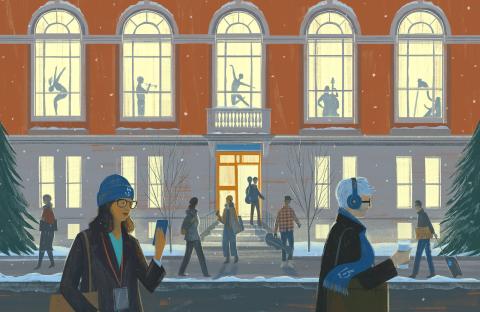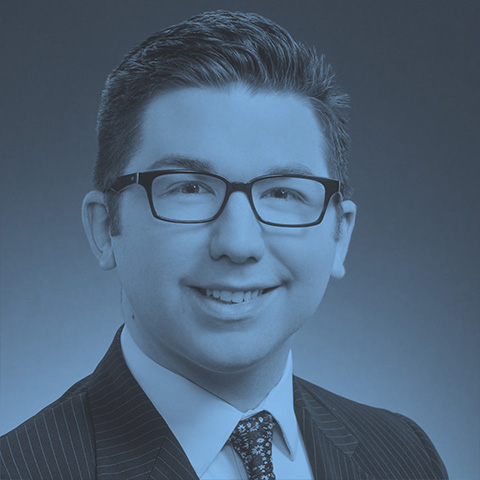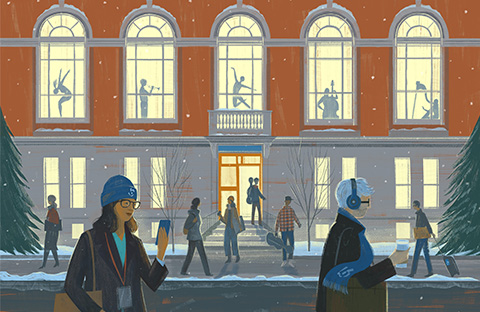Future Proof

Illustration by Sam Kalda
If you’ve studied at a conservatory, you have—by necessity—given quite a bit of thought to who you are and what you want to say. You have used your artistry to form genuine connections with others, be they audience or ensemble members. You have learned how to collaborate generously, knowing when to lead and when to play a supporting role. You’ve had years of practice giving and receiving constructive feedback, including honest assessments of your own work. You have acquired the flexibility to make adjustments to your performance in real time. And you’ve found meaningful ways to harness your passion and use it for some greater purpose.
Conservatories are where young artists go to level up, not just as performers but as people. In the process, they build competencies that may seem incidental at first glance but turn out to be at the very core of professional success.
As Boston Conservatory alums can attest, these “future-proof” skills transfer to a remarkably wide range of professional contexts. Some have used them to become resilient, multihyphenate artists. Others have parlayed these skills into entirely new careers, often with fascinating, almost poetic results, like a dancer who assists with neurosurgery, a soprano serving as a public defense lawyer, and a musical theater actor running for United States Senate. When Victoria Daylor (B.F.A. '17, contemporary dance) moves through an operating room, she still thinks like a dancer. Law student Amy Onyonyi (B.M. '20, voice) uses the same color-coding system to review a legal brief that she once used to analyze an opera score. And politician Keith Potts (B.F.A. '12, musical theater) draws on techniques from his Shakespearean acting class to connect with potential voters on the campaign trail.
Boston Conservatory not only nurtures excellent performers, it also makes them adaptable to new and unexpected stages. For alums who choose careers away from the spotlight, their Conservatory training makes them better leaders, teachers, advocates, and coworkers. Being an artist is a way of observing and conversing with the world around you, and that mindset never leaves you—whether you are performing professionally or not.
Dual Passions

Victoria Daylor
Victoria Daylor (B.F.A. '17, contemporary dance) was just establishing herself as a professional dancer in the U.S. and abroad when she learned that her unusual flexibility was the result of a genetic condition known as hypermobile Ehlers-Danlos syndrome (hEDS). The disorder affects the connective tissue in her joints, allowing her to bend her body into striking shapes—but the very thing that made her unique as a dancer was leading to injuries that threatened her ability to perform professionally.
Daylor always had an interest in anatomy—something she considers a natural extension of her love for dance and the heightened awareness of her body’s movements that has come with it. After her diagnosis, that interest became an obsession and she “went down a rabbit hole,“ learning everything she could about hEDS.
“I just became really fascinated with the condition because people don’t know much about it,” she says. “I became so intrigued that I felt like it was actually something worth pursuing as a career.”
This past April, Daylor completed Columbia University’s post-baccalaureate program in premedical studies. While a student there, she interned as a “patient-scientist” at Norris Lab in Charleston, South Carolina, and eventually secured a permanent position assisting with clinical research. She is currently in the process of applying to medical school and has found that her Conservatory training makes her a stronger candidate because it has honed her ability to express herself and relate to others in ways that traditional STEM training does not.
Pivoting to the medical field has posed many challenges, but Daylor says that—as with dancing—her curiosity inspires and motivates her. “I feel very lucky that I’ve had two great passions in my life. I always thought if I left dance it would be this horrific, heartbreaking thing. But actually, I just was so excited about another thing that it naturally transferred over.”
“I always thought if I left dance it would be this horrific, heartbreaking thing. But actually, I just was so excited about another thing that it naturally transferred over.”
—Victoria Daylor
Daylor takes obvious delight in the parallels between dance and clinical research. When she is assisting with neurosurgeries, for instance, a cultivated awareness of her body’s movement and positioning serves her well in the operating room. Because she is not scrubbed in, she must stand a certain distance away and make sure not to touch certain people or objects. “I have to kind of rehearse it, even physically. I have to know exactly where to stand,” she says. “It’s almost like a dance.”
Leading with Curiosity

Sharmarke Yusuf
When Sharmarke Yusuf (B.F.A. '20, contemporary theater) enrolled in the Conservatory’s contemporary theater program, he wanted to be an actor. These days, he is far more expansive about his life in the arts. If you explore Yusuf’s Instagram profile, you’ll find his keen-eyed photography, excerpts from his original writing, and performances of his spoken-word poetry, in addition to behind-the-scenes shots of his work as an actor in acclaimed regional theater productions. And at the top of that profile, you will find this very apt description: “Actor / Poet / Playwright / Photographer / Storyteller / Truth-seeker & whatever else I want to be.”
In 2022, Yusuf won an Elliot Norton Award for his role in BLKS by Aziza Barnes. Later that year, he played a poet in Fabulation; or, The Re-Education of Undine at Boston’s Lyric Stage Company. It’s no coincidence that he calls himself a poet now. Yusuf minored in creative writing while at Boston Conservatory, and ever since, he has been exploring the interplay of language, emotion, and performance.
Yusuf says his experience in the contemporary theater program, with its emphasis on artistic curiosity and multidisciplinary theater making, introduced him to a breadth of possibilities. “I like to think that curiosity, for me, is innate. But I think that was definitely fostered at BoCo,” he says. “It allowed me to view myself more fully as an artist—and what I can be. It just fostered that drive.”
Now a resident of New York City, he has immersed himself in the poetry scene there. “I have found that all my different interests kind of intersect with each other and fuel each other,” he says. “It feels really organic, following these different interests.” Incorporating a newfound love—and intuitive talent—for photography, he is also branching out into visual arts, adapting his poetry performances into short films.
“I have found that all my different interests kind of intersect with each other and fuel each other.”
—Sharmarke Yusuf
“Lately, I want to follow things that I feel some sort of spiritual alignment with. I try not to get into my five-year plan, or my 10-year plan,” he says. Ideally, his career trajectory will lead him someplace he hasn’t thought of yet. “It’s something that hasn’t even entered my mind, you know? But I’m enjoying it and feel fulfilled—and a lot of passion for it.”
From Empathy to Advocacy

Keith Potts
Keith Potts (B.F.A. '12, musical theater) became a rising star in Indiana state politics for the most personal of reasons. Shortly after he moved to Indianapolis to live with his husband (an Indiana native), then governor Mike Pence signed the Religious Freedom Restoration Act, effectively legalizing discrimination against the LGBTQ community on religious grounds. Potts was “spurred to action,” and in very short order he went from volunteering with local advocacy groups to winning a seat on the Indianapolis city council, defeating his incumbent opponent with 61% of the vote.
In July 2023, Potts announced that he would run for U.S. Senate on a platform emphasizing middle-class job growth and access to affordable health care. He campaigned throughout the state for six months until withdrawing from the race in mid-December. As an underdog candidate traversing a decidedly red state, Potts led with empathy, compassion, and humor as he traveled from county to county, building connections with potential voters. Despite exiting the race, he still works closely with Indiana Democrats, hoping to secure a Senate victory in 2024.
Campaigning is very much like theater, Potts says, only he’s not playing a character. He is telling his own story in hopes of finding commonalities with voters. “As an actor, you want to dig into a character’s background. Well, I want to figure out a way to share my background that resonates with people, so that people can connect to me,” he explains.
“As an actor, you want to dig into a character’s background. Well, I want to figure out a way to share my background that resonates with people, so that people can connect to me.”
—Keith Potts
Potts says his Boston Conservatory training—particularly his Shakespeare class with Associate Professor Doug Lockwood—often comes into play on the campaign trail. Just as an actor adapts written dialogue to the character’s given circumstances, Potts adapts his campaign talking points to individual voters’ concerns. And when meeting constituents face to face, he pays close attention to the stories they share about their own lives, so that when he’s delivering a speech, he knows exactly who in the crowd is most likely to connect with what he is saying.
“Learning that flexibility while utilizing a very specific text is so similar to how a political stump speech works,” he says. Above all, though, his Boston Conservatory training has given him “the ability to simply communicate—to be unabashed and unembarrassed to get up in front of a room and say, ‘This is what I believe.’”

Amy Onyonyi
Like Potts, Amy Onyonyi (B.M. '20, voice) was drawn to a career that would allow her to advocate for others while incorporating her experience as a performing artist. As a student at Boston Conservatory, Onyonyi took a course called Legal Aspects of the Music Industry with Professor Tonya Butler, an accomplished attorney and chair of Berklee College of Music’s Music Business/Management Department. Onyonyi noticed that many of her classmates wanted nothing to do with business or legal aspects of their performance careers. They simply wanted to focus on their art—which put them at a disadvantage professionally.
“I thought, ‘Oh, I’d love to be the person that worries about all of that story,’” she says. “Somebody who also understands the artist’s experience might be in a better position to advocate for them.”
“Somebody who also understands the artist’s experience might be in a better position to advocate for them.”
—Amy Onyonyi
Now in her third year at Boston College Law School, Onyonyi also works for BC’s public defender clinic, representing indigent clients in district court. The performance strategies she learned at Boston Conservatory enable her to take control of the space and serve her well in the courtroom, she says. And it just so happens that the color-coding system she developed to analyze opera scores applies to analyzing court cases as well.
Though law school has kept her incredibly busy, Onyonyi still finds opportunities to perform. She won the Boston College Law School talent show, and this past spring she was invited to perform the Black national anthem at the Massachusetts Black Lawyers Association’s 50th anniversary gala. This coming May, she will sing at BC Law’s graduation ceremony.
Onyonyi draws confidence from the options she’s created for herself professionally, and she intends to keep advocating on behalf of fellow performers—“giving artists access to the legal world and demystifying it,” she says, “because sometimes it can seem so unnecessarily intimidating.”
“Everything That You Need Is Already in You”

Eleri Ward
In the thick of the COVID-19 pandemic, Eleri Ward (B.F.A. '17, musical theater) set out to record an album of Stephen Sondheim covers. Alone in her apartment, with a walk-in closet for a studio, Ward had only her voice, her guitar, and “a really cheap microphone” propped on a stand held together by duct tape. Despite this bare-bones setup, she felt perfectly equipped to make the record, A Perfect Little Death, which would end up launching her career to thrilling new heights.
Ward says she’s not a fan of musical theater cast recordings, so she decided to make the kind of Sondheim album she’d always wanted to hear: subtle, intimate, and very much in the vein of contemporary folk singer-songwriters like Sufjan Stevens (one of her major influences). She completed the recording in a month, then promoted it herself, she says, by “banging on doors, trying to secure media coverage.” Months of diligence paid off when Ward was offered a contract from Ghostlight Records, which released A Perfect Little Death in 2021 and its follow-up, Keep a Tender Distance, in 2022.
Ward never anticipated that the album would be picked up by a record label, but at the same time, she never doubted that she was onto something good. Guided by her own taste and intuition, she felt fully prepared to make it happen, even if she had to complete the project entirely on her own.
“I think the music industry can sometimes make you feel like you are at the mercy of the powers that be,” she says. “You feel like you have to be told ‘yes’ by someone else in order to move forward.” First saying yes to herself allowed the gatekeepers to follow suit. “Everything that you need is already in you,” Ward says. “It's just a matter of, one, self-awareness . . . and, two, using that awareness to not let the set of circumstances be the thing that defines whether or not you are capable of something.”
Propelled by the success of both Sondheim albums, a solo concert tour for Keep a Tender Distance, and a national arena tour opening for Josh Groban, Ward soon was offered yet another unexpected opportunity. An agent from Paradigm Talent Agency reached out, urging her to write an original musical. Though she had been writing pop songs for years, she’d never considered writing for theater and was daunted by the prospect of maintaining plot and character arcs across a collection of songs. But she accepted the challenge and is now collaborating with cowriters on two new musicals—and feeling more inspired than ever as a writer.
“It’s really interesting to learn about yourself as an artist and what your process is when you’re placed in a new context because contexts can vary and environments can vary, but you are you.”
—Eleri Ward
“It’s really interesting to learn about yourself as an artist and what your process is when you’re placed in a new context,” she says, “because contexts can vary and environments can vary, but you are you. And you are the same you, regardless of what situation you’re in.”
“Companies Are Relying on People Like Us”

Tyler Lenhart
When Tyler Lenhart (B.F.A. '14, musical theater) decided to pivot away from professional acting, he found a welcoming new home in higher education. As an admissions administrator at New York University’s Tisch School of the Arts, Lenhart works directly with high school students auditioning for Tisch’s undergraduate drama program. Guided by his own Boston Conservatory training and his experience in national tours of Annie and A Gentleman’s Guide to Love and Murder, he believes that young performers should embrace their arts education with confidence, knowing it will prepare them for whatever career lies ahead.
In the 10 years since he graduated from the Conservatory, Lenhart has grown even more convinced that performance skills transfer to a vast range of jobs—and that employers have learned to see the value of arts training. With so-called “soft skills” more in demand than ever, the business world is finally catching up with what conservatories have known all along: the workplace requires creative and emotional intelligence.
“Employers are putting such an emphasis on not only responding to your own emotions, but how to interpret other people’s emotions, which is not something that we were [seeing] a few years ago,” Lenhart says.
“Employers are putting such an emphasis on not only responding to your own emotions, but how to interpret other people’s emotions, which is not something that we were [seeing] a few years ago.”
—Tyler Lenhart
With its emphasis on authentic self-expression, performing arts training strengthens these emotional and relational muscles in ways that traditional academics cannot. At a place like Boston Conservatory, he says, “you’re surrounded by people who are preparing to be incredibly vulnerable at all times, whether it’s a concert or a play or whatever it may be. A lot of companies are—at least in my experience—relying on people like us, people who are artist-minded, to help facilitate those conversations and be leaders in that particular aspect.”
From his own days as a student—and his experience in his current role at NYU—Lenhart knows that many young artists feel pressure to land high-profile performance jobs right out of school. He maintains that sharing a more diverse range of success stories might help to reduce that pressure and illuminate the many ways that conservatory skills can be applied.
“I think a bigger and more interesting and helpful conversation can be had [about] shifting what an arts education means and how valuable artists are in the workplace,” Lenhart says. “There are so many other cool and interesting ways that we can support ourselves.”
Discovering Hidden Talents

Nathaniel Taylor
After nine years of study at Boston Conservatory, Nathaniel Taylor (B.M. '15, G.P.D. '17, P.S.C. '18, A.D. '20, cello) had a prestigious artist diploma and several competition prizes under his belt. Although he was well positioned to launch a career as a classical soloist, that path had begun to lose its appeal. Taylor wanted to explore his musicality outside the classical sphere and collaborate with fellow artists on a more inclusive range of repertoire.
With that in mind, he joined the conductor-less chamber ensemble Palaver Strings in 2022, finding alignment with the ensemble’s mission “to strengthen and inspire community through music.” That same year, he became the cellist for a classical crossover quartet, Sons of Serendip, and encountered a most unexpected challenge.
His bandmates wanted to know if he could sing.
“They were like, ‘Hey, do you think you could try harmonizing some stuff?’ And I was like, ‘You mean with my cello?’” Taylor says.
Given that most of his prior singing experience had been in the shower, Taylor felt “pretty insecure” about it. But he quickly found that this added role as backup vocalist gave him access to new and more personal forms of musical expression, allowing him to open up with his voice.
“I discovered a hidden talent, apparently. I love singing now,” he says. “Honestly, I can’t really stop because I’m just enjoying the process of it.”
Taylor makes a point of putting himself outside his comfort zone, musically speaking, and he encourages other artists to do the same. Embracing a wider range of cultures and genres expands self-knowledge, builds technique, and ultimately advances the artform, he explains.
“I really want to take time to understand things that I don’t [already know] about music. That’s been one of the biggest impacts for me . . . collaborating with people and being able to pick their brain,” he says, and ask them, “How is it that you express yourself on your instrument?”
Taylor now moves fluently across genres, covering Stevie Wonder with Sons of Serendip one day and performing a concert of all Syrian music with Palaver Strings the next. He also remains connected to the classical world. This past May, he joined Yo-Yo Ma and three other cellists in performance at the Smithsonian National Museum of American History to celebrate Ma’s receiving that revered institution’s Great Americans Medal. Taylor performed on the museum’s 1701 “Servais” Stradivarius—an experience so amazing, he says, he “didn't want to give it back.”
“I definitely became much more self-aware as a cellist when I started doing out-of-the-box type of things. It really broadened my perspective on what’s possible for me.”
—Nathaniel Taylor
Embracing the unfamiliar not only broadened his musicality, it helped Taylor to understand himself better and clarify what he wants to say with his work. “I definitely became much more self-aware as a cellist when I started doing out-of-the-box type of things,” he says. “It really broadened my perspective on what’s possible for me. I’m at a point where I feel like there’s limitless possibilities now.”
READ: STAGES 2024

“Future Proof” first appeared in the 2024 issue of STAGES, Boston Conservatory’s annual magazine.
